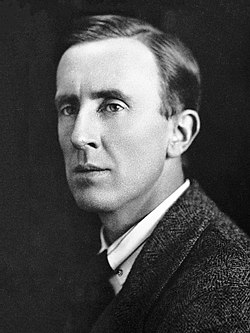J.R.R. Tolkien Quote
Under the Mountain dark and tallThe King has come unto his hall!His foe is dead,the Worm of Dread,And ever so his foes shall fall.The sword is sharp, the spear is long,The arrow swift, the Gate is strong;The heart is bold that looks on gold;The dwarves no more shall suffer wrong.The dwarves of yore made mighty spells,While hammers fells like ringing bellsIn places deep, where dark things sleep,In hollow halls beneath the fells.-from The Hobbit (Dwarves Battle Song)
J.R.R. Tolkien
Under the Mountain dark and tallThe King has come unto his hall!His foe is dead,the Worm of Dread,And ever so his foes shall fall.The sword is sharp, the spear is long,The arrow swift, the Gate is strong;The heart is bold that looks on gold;The dwarves no more shall suffer wrong.The dwarves of yore made mighty spells,While hammers fells like ringing bellsIn places deep, where dark things sleep,In hollow halls beneath the fells.-from The Hobbit (Dwarves Battle Song)
Related Quotes
It is for your own good to love a dare-devil rather than a holy coward. A dare-devil is a unique devil, battling your fears, your pains, conquering your uncertainties, carrying you his arms, and flyin...
Michael Bassey Johnson
Tags:
battle, conqueror, corrosive, cowardice, dare devil, despair, dread, dreadful, equanimity, fear
About J.R.R. Tolkien
John Ronald Reuel Tolkien (, 3 January 1892 – 2 September 1973) was an English writer and philologist. He was the author of the high fantasy works The Hobbit and The Lord of the Rings.
From 1925 to 1945 Tolkien was the Rawlinson and Bosworth Professor of Anglo-Saxon and a Fellow of Pembroke College, both at the University of Oxford. He then moved within the same university to become the Merton Professor of English Language and Literature and Fellow of Merton College, and held these positions from 1945 until his retirement in 1959. Tolkien was a close friend of C. S. Lewis, a co-member of the informal literary discussion group the Inklings. He was appointed a Commander of the Order of the British Empire by Queen Elizabeth II on 28 March 1972.
After Tolkien's death his son Christopher published a series of works based on his father's extensive notes and unpublished manuscripts, including The Silmarillion. These, together with The Hobbit and The Lord of the Rings, form a connected body of tales, poems, fictional histories, invented languages, and literary essays about a fantasy world called Arda and, within it, Middle-earth. Between 1951 and 1955 Tolkien applied the term legendarium to the larger part of these writings.
While many other authors had published works of fantasy before Tolkien, the tremendous success of The Hobbit and The Lord of the Rings ignited a profound interest in the fantasy genre and ultimately precipitated an avalanche of new fantasy books and authors. As a result he has been popularly identified as the "father" of modern fantasy literature and is widely regarded as one of the most influential authors of all time.
From 1925 to 1945 Tolkien was the Rawlinson and Bosworth Professor of Anglo-Saxon and a Fellow of Pembroke College, both at the University of Oxford. He then moved within the same university to become the Merton Professor of English Language and Literature and Fellow of Merton College, and held these positions from 1945 until his retirement in 1959. Tolkien was a close friend of C. S. Lewis, a co-member of the informal literary discussion group the Inklings. He was appointed a Commander of the Order of the British Empire by Queen Elizabeth II on 28 March 1972.
After Tolkien's death his son Christopher published a series of works based on his father's extensive notes and unpublished manuscripts, including The Silmarillion. These, together with The Hobbit and The Lord of the Rings, form a connected body of tales, poems, fictional histories, invented languages, and literary essays about a fantasy world called Arda and, within it, Middle-earth. Between 1951 and 1955 Tolkien applied the term legendarium to the larger part of these writings.
While many other authors had published works of fantasy before Tolkien, the tremendous success of The Hobbit and The Lord of the Rings ignited a profound interest in the fantasy genre and ultimately precipitated an avalanche of new fantasy books and authors. As a result he has been popularly identified as the "father" of modern fantasy literature and is widely regarded as one of the most influential authors of all time.
